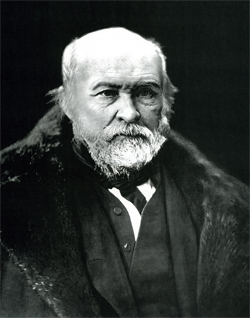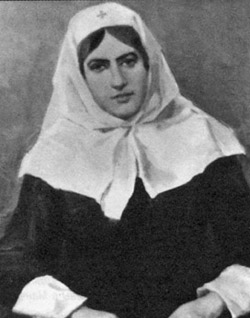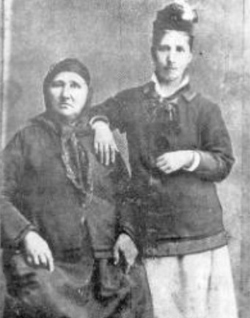A wave of enthusiasm swept over the country as news of the manifesto by force of which Russia declared war on the Ottoman Empire reached the Russian people. Russia’s intellectuals were particularly active, and especially doctors. They organized hospitals and infirmaries, sanitary trains and units. As the Russo-Turkish war of 1877-1878 was declared, almost 1,600 doctors and more than 3,000 nurses joined the army. For the first time 780 stretcher bearers took part.
 The medical service was, for a time, headed by world-famous surgeon Nikolay Ivanovich Pirogov who had come to Bulgaria. Though advanced in years (67) he had an amazing capacity for work. He examined the wounded, performed over 600 operations saving the lives of hundreds of Russian soldiers and Bulgarians, but he also undertook to organize field hospitals. Back in Russia, he wrote: “Not one of the previous wars has ever brought together, on the battlefield, such an intellectual potential, as this one did on the battlegrounds in Bulgaria.”
The medical service was, for a time, headed by world-famous surgeon Nikolay Ivanovich Pirogov who had come to Bulgaria. Though advanced in years (67) he had an amazing capacity for work. He examined the wounded, performed over 600 operations saving the lives of hundreds of Russian soldiers and Bulgarians, but he also undertook to organize field hospitals. Back in Russia, he wrote: “Not one of the previous wars has ever brought together, on the battlefield, such an intellectual potential, as this one did on the battlegrounds in Bulgaria.”
Besides Pirogov, there were another 300 professors, associate professors, assistant professors and residents from the biggest university clinics in Russia. Armed with the most modern methods of treatment of gunshot wounds and battlefield diseases, they registered one of the lowest death rates among the wounded in those times – 10.8 percent.
In Bulgaria, the Russian doctors applied new medical methods. Prof. S.P. Kolomnin was the first to have performed arterial blood transfusion. F. F. Erisman developed a system of disinfection and mandatory isolation of patients with infectious diseases, Prof. S. P. Botkin discovered contagious jaundice and gave the army quinine as anti-malaria prophylaxis. Here, Pirogov was the first person in the world to have made a plaster bandage.
 Almost 3,000 Russian women joined the army as nurses, paramedics and doctors. They worked in the battlefields, in field hospitals, in the typhoid camps. They included members of the aristocracy – Princess Golitsyna, Maria Mikhailovna – sister of Prince Prince Dondukov-Korsakov, Princess Shakhovskaya, Baroness Julia Vrevskaya, who wrote the unforgettable words: “I belong to Bulgaria, heart and soul.” And who died of typhoid in January 1878 at one of the infirmaries in the town of Byala. Another 50 women lost their lives in the war, and 90 nurses came down with typhoid fever.
Almost 3,000 Russian women joined the army as nurses, paramedics and doctors. They worked in the battlefields, in field hospitals, in the typhoid camps. They included members of the aristocracy – Princess Golitsyna, Maria Mikhailovna – sister of Prince Prince Dondukov-Korsakov, Princess Shakhovskaya, Baroness Julia Vrevskaya, who wrote the unforgettable words: “I belong to Bulgaria, heart and soul.” And who died of typhoid in January 1878 at one of the infirmaries in the town of Byala. Another 50 women lost their lives in the war, and 90 nurses came down with typhoid fever.
 Bulgarian medics, graduates of universities in Russia and Romania, joined their colleagues from Russia in the Russo-Turkish war. Many of them were volunteers in the Russian army, others organized hospitals in the liberated territories. In each one of the first three Bulgarian volunteer companies there was one doctor with the rank of officer – Konstantin Bonev, Sava Mirkov and Konstantin Vezenkov. For their acts of bravery, The Russian Empire awarded them different orders. Dr. GeorgiTsarigradski who helped save 800 Russian soldiers from frostbite in the Balkan range also received an order for his bravery.
Bulgarian medics, graduates of universities in Russia and Romania, joined their colleagues from Russia in the Russo-Turkish war. Many of them were volunteers in the Russian army, others organized hospitals in the liberated territories. In each one of the first three Bulgarian volunteer companies there was one doctor with the rank of officer – Konstantin Bonev, Sava Mirkov and Konstantin Vezenkov. For their acts of bravery, The Russian Empire awarded them different orders. Dr. GeorgiTsarigradski who helped save 800 Russian soldiers from frostbite in the Balkan range also received an order for his bravery.
At the beginning of the war many Bulgarian women asked hospitals and infirmaries to let them help the wounded and the sick. The public at large also joined in the efforts to help the wounded and the ailing. Many people harnessed their carts to transport the wounded to hospitals. The people of Kotelsupported the local infirmary financially for two whole months, more than 1,000 Bulgarians helped transport the wounded from Shipka peak. The wounded and the sick from inland areas spent the winter in Svishtov on the Danube. Around 3,000 wounded were put up at 50 Bulgarian homes in the town – Svishtov came to resemble one sprawling war hospital.
War chronicles usually dwell at great length on strategy and tactics, yet heroic deeds in wartime seem to overshadow the day-to-day efforts of the nameless heroes of the medical profession. In the centre of Sofia, surrounded by chestnut trees and rose bushes, there rises a memorial obelisk – the Doctors’ Monument - built to honour the medical ranks who lost their lives in the Russo-Turkish war. The monument – the only monument of its kind in Europe – is made of natural blocks of stone, on which the names of 531 men and women of the medical profession have been inscribed. Every year, on the eve of Bulgaria’s national day, March 3, the monument is covered in flowers, as people go to pay their respects to the memory of the medics killed in that war.
English version: Milena Daynova
Photos: archive